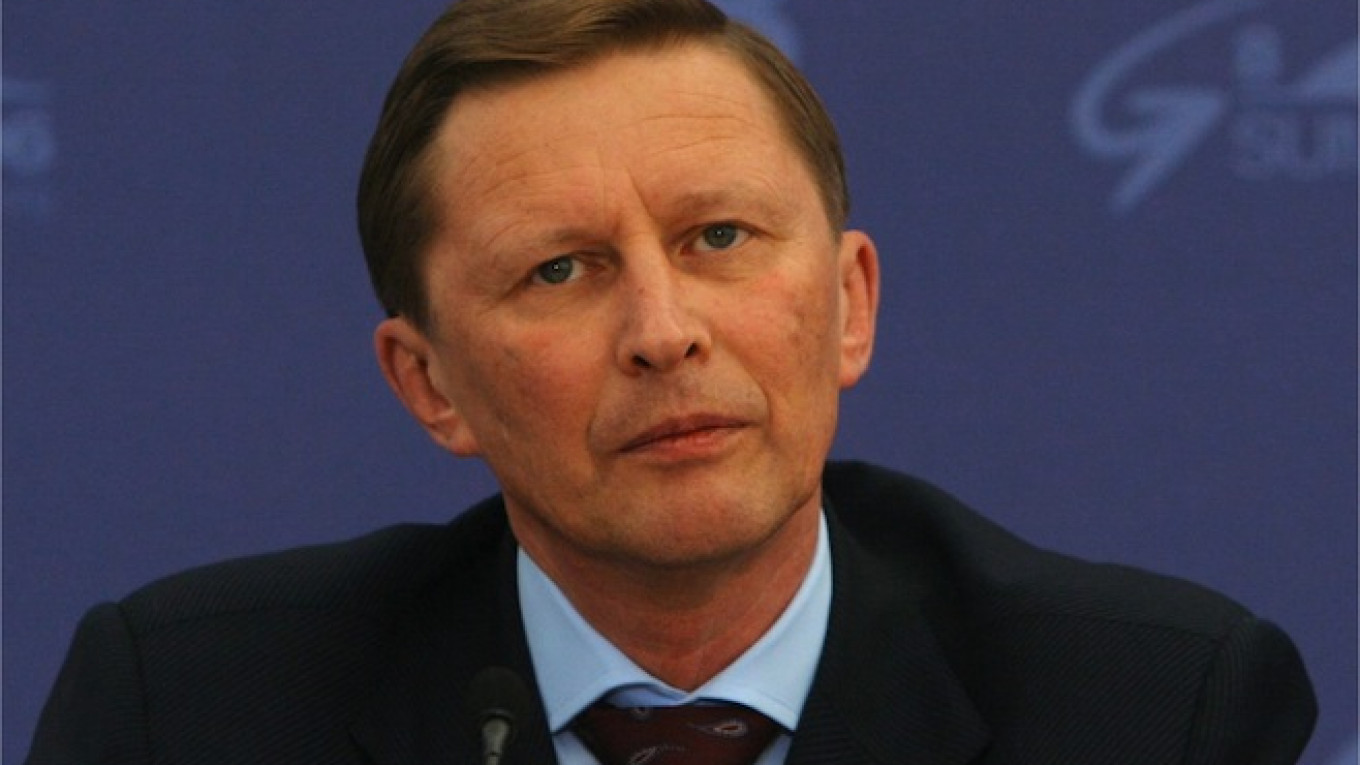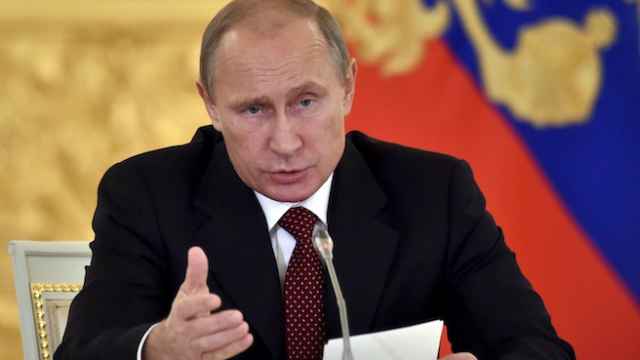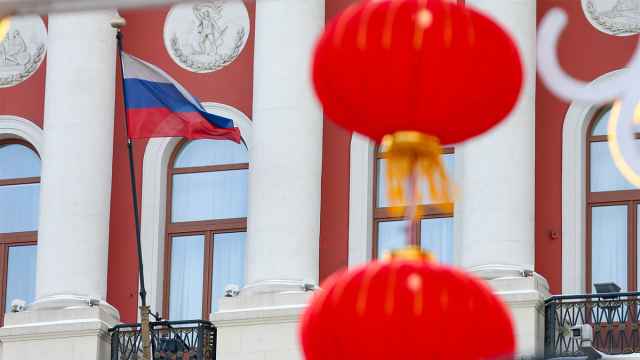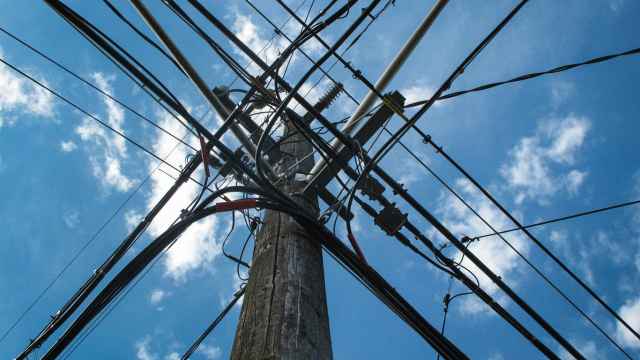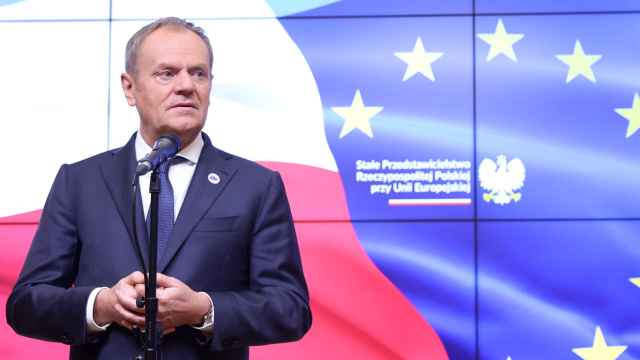The Kremlin's chief of staff has said Russia could serve as a "guarantor" of a peace settlement in Ukraine and that Moscow's support for the demands of eastern Ukrainian separatists was a demonstration of its commitment to "real democracy."
Sergei Ivanov also claimed that Russia's democratic achievements were significantly more profound than those of Ukraine, according to an interview with the Komsomolskaya Pravda daily published Wednesday.
"As I understand it, there is no crackdown taking place [in Russia]. At least, not of the kind that is going on now in the 'democratic' Ukraine," Ivanov was quoted as saying. "Do we have political opponents beaten left and right on the street? Do they get stuffed into garbage containers?"
Last month, Ukrainian demonstrators dumped opposition lawmaker Vitaly Zhuravsky, a former ally of ousted President Viktor Yanukovych, into a trash container, accusing him of hindering attempts to end fighting in the east of the country. Zhuravsky did not appear to have been injured in the incident and continued to argue with protesters from inside the trash bin, according to videos posted online.
In Russia, protesters can be arrested for rallying without a permit, and no incidents of demonstrators assaulting a lawmaker have been reported lately. The only recent attack against a lawmaker targeted regional legislator Lev Shlosberg from Pskov, who had been investigating reports of the alleged deployment of Russian paratroopers to Ukraine and who was hospitalized with head injuries after three men beat him on the street.
In another instance of Russia's supposed commitment to human rights, Ivanov cited the fact that the government gave permission for an anti-war rally to take place in Moscow last month.
But he denounced the thousands-strong gathering for the supposed discrepancy between its declared anti-war agenda and its "real content" — and for the scarcity of President Vladimir Putin's portraits among protesters' banners.
"If they were holding Russian flags and the portraits of Putin, maybe even along with portraits of [Ukrainian President Petro] Poroshenko and demanded: 'Let's support a truce,' then I would understand that," Ivanov was quoted as saying. "But the slogans were different. And the flags were different."
However, photographs taken by a Moscow Times photographer appear to give evidence to the contrary: The late September rally was awash in Russian flags side by side with Ukrainian ones, and a huge banner carried by a line of demonstrators read "Together against war."
Among Ukraine's supposed transgressions against human rights, Ivanov in his interview with Komsomolskaya Pravda also named a move by Ukraine's parliament shortly after Yanukovych's ouster early this year to strip the Russian language of its official status in eastern Ukrainian region.
The proposal was quickly overturned by the then-acting president, but Russia's government rhetoric has frequently cited the incident as evidence of Ukraine's supposed discrimination against its Russian speakers, usually without mentioning that the bill was defeated.
Ivanov argued that as long as Ukraine's separatists "don't want to live in the conditions that are being created by Kiev, if they just basically want to speak Russian, the native language, and not Ukrainian, then how can they be mandated by force? That, pardon me, is genocide and ethnic cleansing," he told Komsomolskaya Pravda.
Russia was willing to "in some form act as a guarantor" of a peace settlement, "if final agreements are reached" by the sides, he was quoted as saying.
Ivanov also conceded that Russian "volunteers" were fighting alongside Ukraine's separatists and said that Moscow supports their demands.
"We support them morally, because we are simply seeking a real democracy, and not the current kind, in quotation marks, which reigns in Ukraine, are seeking human rights to be ensured fully," he was quoted as saying.
A Message from The Moscow Times:
Dear readers,
We are facing unprecedented challenges. Russia's Prosecutor General's Office has designated The Moscow Times as an "undesirable" organization, criminalizing our work and putting our staff at risk of prosecution. This follows our earlier unjust labeling as a "foreign agent."
These actions are direct attempts to silence independent journalism in Russia. The authorities claim our work "discredits the decisions of the Russian leadership." We see things differently: we strive to provide accurate, unbiased reporting on Russia.
We, the journalists of The Moscow Times, refuse to be silenced. But to continue our work, we need your help.
Your support, no matter how small, makes a world of difference. If you can, please support us monthly starting from just $2. It's quick to set up, and every contribution makes a significant impact.
By supporting The Moscow Times, you're defending open, independent journalism in the face of repression. Thank you for standing with us.
Remind me later.


